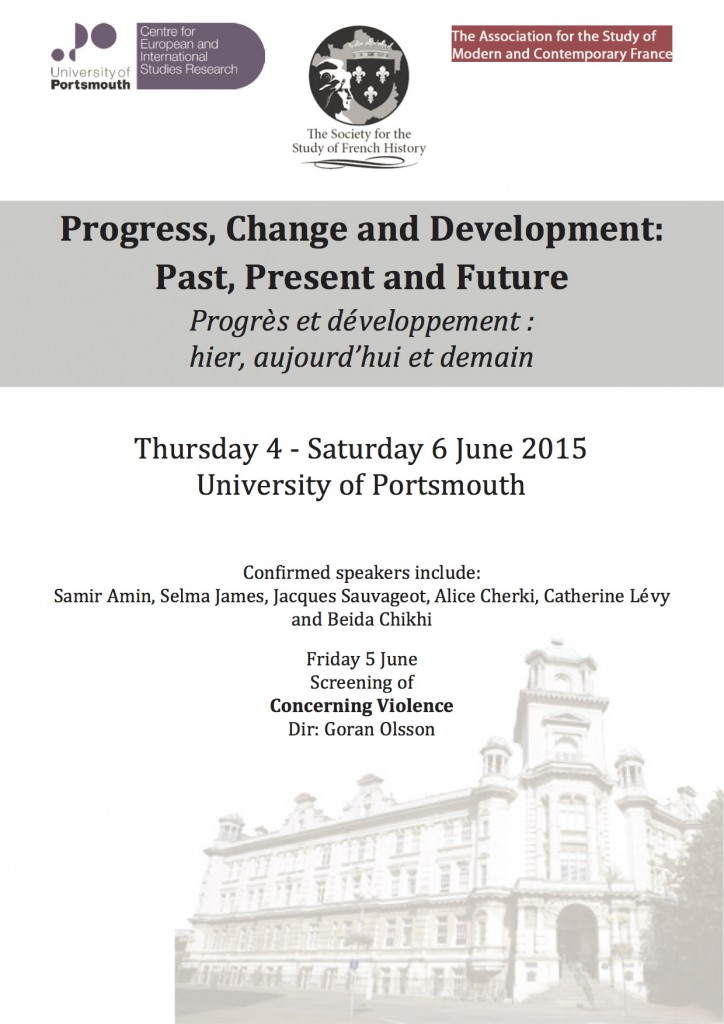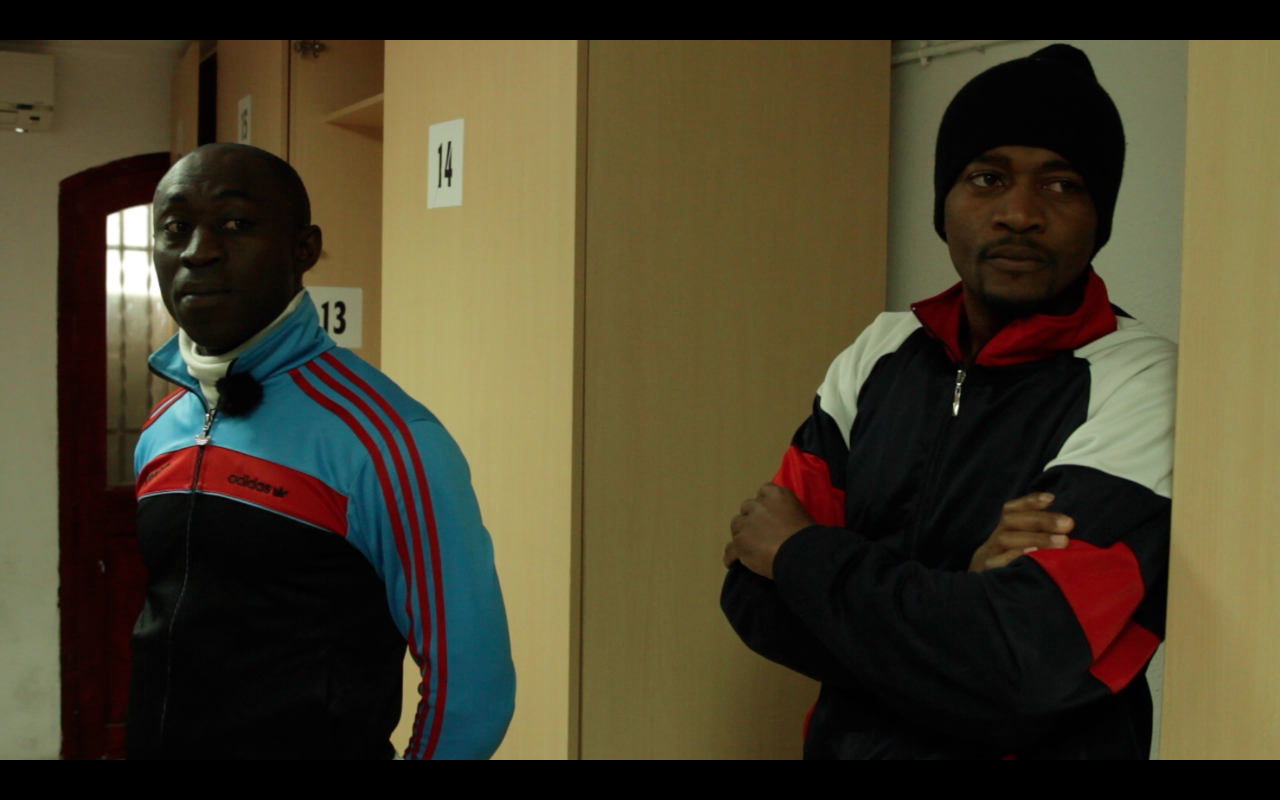Progress, Change and Development: Past, Present and Future
Thursday 4 – Saturday 6 June 2015, University of Portsmouth
This three day interdisciplinary conference brings together some of the generation who were involved in attempts to bring about intellectual, social and political change in the 1960s and 1970s with historians and theorists currently studying these movements, as well as practitioners and activists working in the fields of progress and development today.
Confirmed speakers include Samir Amin, Selma James, Jacques Sauvageot, Alice Cherki, Catherine Lévy and Beida Chikhi
Register by Thursday 28 May 2015 via the University of Portsmouth Online Store:
http://onlinestore.port.ac.uk/browse/extra_info.asp?compid=1&modid=2&deptid=22&catid=25&prodid=155
A full programme for the conference can be found below.
For further information, please contact the conference organisers, Margaret Majumdar and Joanna Warson, via francophone@port.ac.uk
***
Thursday 4 June 2015
10.00 – 11.00: Registration and Coffee (Park Building LRC)
11.00 – 11.30: Opening and Introduction (Park 1.23)
Ann Matear, Head of the School of Languages and Area Studies, University of Portsmouth
Tony Chafer, Director of the Centre for European and International Studies Research, University of Portsmouth
11.30-13.00: Session 1 – Decolonisation, Progress and Development in Africa I (Park 1.23)
Chair: Margaret Majumdar (Portsmouth)
- Selma James (Global Women’s Network) – Ujamaa: Rural grassroots development in Tanzania
- Samir Amin (Third World Forum) – Towards the revival of the spirit of Bandung
13.00 – 14.00: Lunch (Park LRC)
14.00 – 15.30: Session 2 – Revolutionary and Progressive Movements: International Perspectives (Park 1.23)
Chair: Jodi Burkett (Portsmouth)
- Chris Reynolds (Nottingham Trent), ‘Northern Ireland’s 1968 in a post-troubles context’
- Manus McGrogan (Portsmouth), ‘International impact of the Carnation Revolution 1974-75: radical conceptualisations, then and now’
- Sharif Gemie (South Wales), ‘Cross-Cultural Communication and the Hippy Trail, 1957-1978
15.30 – 16.00: Tea (Park LRC)
16.00 – 17.30: Session 3 – Parallel Panels 3.1 and 3.2
3.1 Decolonisation, Progress and Development in Africa II (Park 1.23)
Chair: Joanna Warson (Portsmouth)
- Anna Bocking-Welch (Liverpool), ‘Set free the hungry half’: Britain, NGOs and the transfer of power in Africa’
- Charlotte Lydia Riley (York), ‘A Study in Frustration? British Overseas Aid and Development in the 1960s and Beyond’
- Ryo Ikeda (Kansai Gaidai), Tunisian Internal Autonomy in 1954 and the Dissolution of the French Empire
3.2. Communication, Theory and Progress (Park 109)
Chair: Fabienne Chamelot (Portsmouth)
- Valentina Vardabasso (UMR IRICE), ‘La stratégie de communication de la Société des Nations: Radio Nation Unies’
- Francesco Caddeo (Jean Moulin Lyon), ‘Se débarrasser de l’identité à l’époque de la résurgence des particularismes’
- Luis Martinez Andrade (EHESS), ‘La théologie de la libération : critique de la modernité’
18.30: BBQ Dinner, Rees Hall
***
Friday 5 June 2015
9.00-9.30: Registration and Coffee (Park Building LRC)
9.30 – 11.00: Session 4 – Revolutionary and Progressive Movements: The Case of France
(sponsored by the Society for the Study of French History) (Park 1.23)
Chair: Tony Chafer (Portsmouth)
- Jacques Sauvageot (ITS), ‘Pour un réformisme révolutionnaire’
- Andrew Smith (UCL), ‘The Summer of ’61: Periphery Challenges to the French State and Early Resistance to Globalization’
- Brian Sudlow (Aston), ‘The Hopelessness of Progressive Hope: Revisiting Réflexions pour 1985’
11.00 – 11.30: Coffee (Park LRC)
11.30 – 12.45: Session 5 – Migration and Diasporic Space (Park 1.23)
Chair : Andrew Smith (UCL)
- Louisa Zanoun (Génériques) & Daniel Gordon (Edge Hill), ‘Changing Memory, Changing Society? Immigration Public History in France’
- Ed Naylor (Portsmouth), ‘The 1975 ‘Arenc Affair’ and the legal turn in pro-immigrant activism in France’
12.45 – 13.45: Lunch
13.45 – 15.30: Session 6 – Parallel Panels 6.1 and 6.2
6.1 Progress and Colonial Relations (Park 1.23)
Chair: Thomas Martin (Leeds)
- Courtnay Micots (Wits Art Museum), ‘Visualizing Nation-Building in African Colonial Architecture in Coastal Ghana’
- Catherine O’Connell (Macquarie, Sydney, Australia), ‘Reading Between the Lines: Identity Issues in Kanak Narratives’
- Helen Lackner (Independent Civic & Social Organisation Professional), ‘The People’s Democratic Republic of Yemen: Revolution, Social Change and Development in a Tribal and Fragmented Society’
- Laetitia Boqui-Queni (Sorbonne), ‘Exploitation et domination coloniale contemporaine à la Réunion
6.2 Progress and Political Economic Development (Park 1.09)
Chair: Patricia Shamai (Portsmouth)
- Ilias Alami (Manchester), ‘Post-crisis Capital Controls in Developing Countries: regaining Policy Space?’
- Vincent Duchaussoy (Rouen), ‘The Franc Zone in West Africa: a successful delayed decolonisation?’
- Ralph Wilde (UCL), ‘Dilemmas in promoting global economic justice through law. A case study of the ‘Maastricht Principles on the Extraterritorial Obligations of States in the Area of Economic, Social and Cultural Rights’ and their associated Commentary’
15.30-16.00: Tea
16.00 – 17.30: Session 7 – National Liberation and Nation-Building: Frantz Fanon (Park 1.23)
Chair: Olivia Rutazibwa (Portsmouth)
- Azzedine Haddour (UCL), ‘Fanon, the Lumpenproletariat and Decolonization’
- Alice Cherki (Psychoanalyst), ‘Les conséquences des silences de l’histoire coloniale sur les jeunes descendants d’anciens colonisés. Actualité de la pensée de Fanon’
18.00 – 19.00 : Reception and dinner (Eldon Building)
19.00 – 21.00 : Film screening (Eldon Building)
‘Concerning Violence’ (2014, dir. Goran Olsson) http://www.imdb.com/title/tt3263690/
Introduced by Olivia Rutazibwa (Portsmouth) and followed by a panel discussion including Charles Leddy Owen (Portsmouth) and Azzedine Haddour (UCL)
***
Saturday 6 June 2015
9.00-9.30: Registration and Coffee (Park Building LRC)
9.30-11.00: Session 8 – Progress: Past, Present and Future (Park 1.23)
Chair: Ed Naylor (Portsmouth)
- Brice Fossard (Paris I), ‘Sports, youth movements and the liberation of Indochina (1940-1945)’
- Yves Montenay (ICEG), ‘Que reste-t-il de la théorie du pillage du Sud’
- Elisabeth Vasileva (Loughborough), ‘To Affinity and Beyond. Postanarchism and Radical Ethics’
11.00 – 11.30: Coffee
11.30-13.00: Session 9 – National Liberation and Nation-Building: Algeria in the 1960s (sponsored by the Association for the Study of Modern and Contemporary France) (Park 1.23)
Chair: Natalya Vince (Portsmouth)
- Catherine Lévy (CNRS), ‘Algérie: libération nationale et construction de la nation, 1962-1965’
- Beïda Chikhi (Paris-Sorbonne), ‘Algérie: la postindépendance, l’effervescence cosmopolite, et la littérature’
13.00 – 14.00: Lunch
Close of conference proceedings


